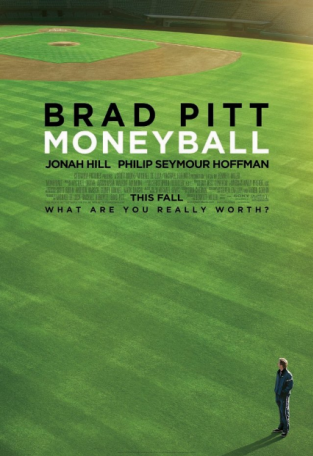Date Posted: September 29, 2011
Print Edition: September 28, 2011
 Historically-based sports movies occupy an area between drama and documentation. Stuck in the middle, they are forced to adhere to what can only sometimes be considered riveting material, and in recreating the scenes that were remarkable enough to inspire a book or a movie, they can end up being less entertaining than the real thing. Moneyball has the advantage of a different approach from a traditional sports narrative, one that isn’t based solely on the win/loss record or even the players of the sport, but in the world of managing and scouting.
Historically-based sports movies occupy an area between drama and documentation. Stuck in the middle, they are forced to adhere to what can only sometimes be considered riveting material, and in recreating the scenes that were remarkable enough to inspire a book or a movie, they can end up being less entertaining than the real thing. Moneyball has the advantage of a different approach from a traditional sports narrative, one that isn’t based solely on the win/loss record or even the players of the sport, but in the world of managing and scouting.
The most prominent of the creative names involved in Moneyball is Aaron Sorkin, most recently praised for his Social Network screenplay. But where that movie was a masterwork of editing and speed-spoken dialogue that became as much a soundtrack to the movie as Trent Reznor and Atticus Ross’s work, Moneyball is a hackwork of pace-halting editing, flatfooted dialogue, and a purported romanticism with the game of baseball that fails to come through in the finished work. It is important to note that the script is not the work of Sorkin, but a re-write of his work by Steven Zaillian, which was originally itself a rewrite of the movie’s first script, written by Stan Chervin.
In its final form, there is very little that has the semblance of reality. While early scout meetings (and, in particular, Jonah Hill’s character) are a mixture of chaotic busywork and true to life banality, the critical scenes involving Brad Pitt as Oakland Athletics general manager Billy Beane fail to convince. Every trade-call goes off without a hitch, every family moment is sweetly swept under the rug, and every sentence is easily finished. There is no hint of the spontaneity and unpredictability that often defines the sports world. The initial meetings with the club’s scouts and Hill are music-less and serve as a sort of demystifying of the big jobs within sports organizations. In these opening scenes, there are no brash announcements or grand speeches. But by the end, the usage of these sports clichés becomes impossible to overlook.
The most egregious error is the handling of Billy Beane’s motivation. This is a critical question of historical importance in the context of the film. Why does he make these moves, both when it comes to player swaps and career choices? After a dramatic unfolding of late season games, we are left with the statement that none of it means anything next to Changing the Game Forever. The movie then takes an overly sentimental turn (complete with camera shoved into Pitt’s watering eyes) into his familial link, suggesting his ultimatum is done as a result of parental love. Both of which are refuted by the overly simplified final title cards.
Moneyball never commits to telling any part of Beane’s story well, leaping from tangent to tangent like an aimless documentary. This lack of committal also comes through in where this movie is targeted. Deeming its material too esoteric, Moneyball gives a surface explanation of the rules of the game and how they are being broken, yet never takes the next step, never uses these narrative decorations to do something other than giving the cinematic equivalent of a dissertation on the effect of sabermetrics on baseball. There is no velocity to the developments of Moneyball. It has no problem skipping through time to hit on all the major events in the season, but has no purpose to its cuts; they play like a rough sketch of a baseball team, rather than an intimate look into one. We’re told, not shown, almost everything concerning the math in the movie, a far cry from what Sorkin was able to do with programming and The Social Network. The closing moments, which contain a character giving a mini-lecture on how people will react to what Beane has done and what that says about the state of the game is the final, limp blow.
Moneyball has very little to say about baseball that will be interesting to non-fans or insightful enough to those who know the significance of the statistical acronyms that have become ingrained in baseball culture. This film had quite an opportunity to do something new in the realm of the sports movie, and the talent onscreen plays the material well enough, but the material, which can’t even avoid having its share of training montages and unprompted speeches, needed to be better to support its 130-plus minute running time. In a slight paradox, perhaps the best scenes in the movie concern the trading of players, not the orchestration of the trades. That’s not the movie Moneyball could or should have been.

